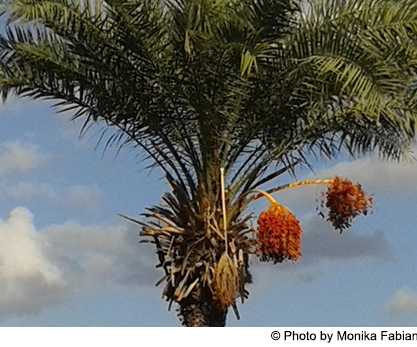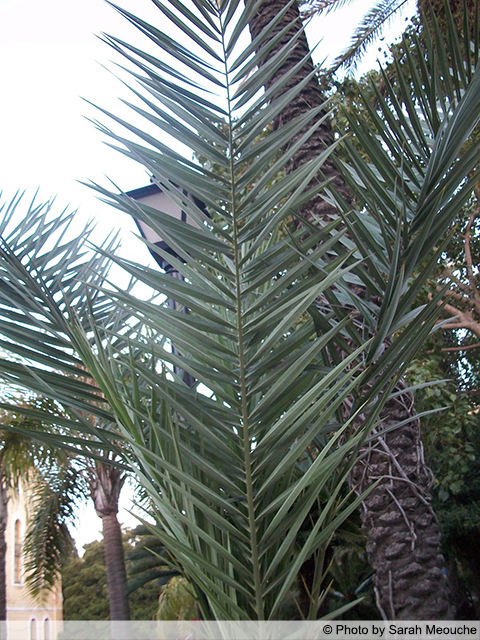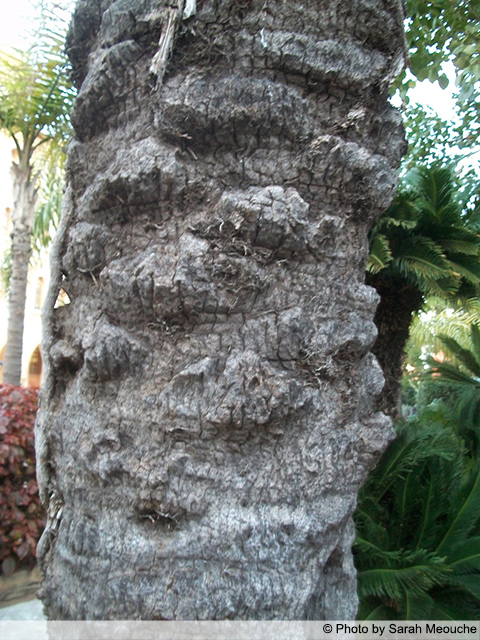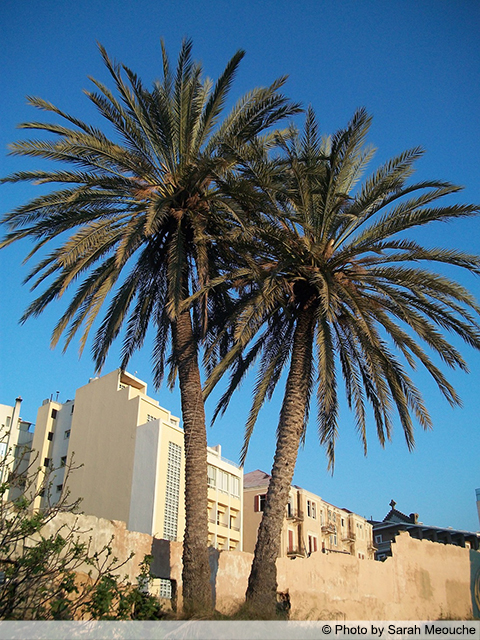Phoenix canariensis (Canary Island Date Palm)
Phoenix canariensis is a large, spreading densly branched palm tree. The trunk grows from compact, robust and stiff when young to thick and straight when mature. The trunk can reach up to 1 m in diameter and is covered by a diamon shaped pappern from old leaf scars. Leaves are long pinnate with sharp thorns at the base of the leaf stalk. It needs full sun and is salt tolerant. Plant on any well drained soil. Make sure while irrigating that the sprinklers don't irrigate the trunk as it will be subject to disases.
- Landscape Information
- Botanical Description
- Horticulture Management
-
By Maria Lemos (Flickr: Jardim da Pena) [CC BY-SA 2.0 (http://creativecommons.org/licenses/by-sa/2.0)], via Wikimedia Commons
-
By Wouter Hagens (Own work) [Public domain], via Wikimedia Commons
-
-
-
-
Search plant on Google
Download as PDF
-
French Name: Palmier des Canaries
Pronunciation: FEE-nicks kan-air-ee-EN-sis
-
Plant type: Palm
-
Origin: Canary Island
-
Heat Zones: 8 to 16
Hardiness Zones: 9 to 13
-
Uses: Specimen, Container, Edible, Wildlife, Street, Pollution Tolerant / Urban
-
Size/Shape
Growth Rate: Slow
Tree Shape: Palm
Canopy Symmetry: Symmetrical
Canopy Density: Open
Canopy Texture: Coarse
Height at Maturity: 8 to 15 m
Spread at Maturity: 5 to 8 meters
Time to Ultimate Height: 20 to 50 Years
-
By Maria Lemos (Flickr: Jardim da Pena) [CC BY-SA 2.0 (http://creativecommons.org/licenses/by-sa/2.0)], via Wikimedia Commons
-
By Wouter Hagens (Own work) [Public domain], via Wikimedia Commons
-
-
-
-
Search plant on Google
Download as PDF
-
Foliage
Leaf Arrangement : Spiral
Leaf Venation: Parallel
Leaf Persistance: Evergreen
Leaf Type: Odd Pinnately compund
Leaf Blade: 30 - 50
Leaf Margins: Entire
Leaf Texture: Rough
Color(growing season): Green
-
Flower
Flower Scent: No Fragance
Flower Color: White
Seasons: Spring, Fall
-
Trunk
Trunk has Crownshaft: No
Trunk Susceptibility to Breakage: Suspected to breakage
Number of Trunks: Single Trunk
-
Fruit
Fruit Type: Drupe
Fruit Showiness: Yes
Fruit Size Range: 1.5 - 3
Fruit Color: Yellow, Orange
Seasons: Spring, Fall
-
By Maria Lemos (Flickr: Jardim da Pena) [CC BY-SA 2.0 (http://creativecommons.org/licenses/by-sa/2.0)], via Wikimedia Commons
-
By Wouter Hagens (Own work) [Public domain], via Wikimedia Commons
-
-
-
-
Search plant on Google
Download as PDF
-
Tolerance
Frost Tolerant: Yes
Heat Tolerance: Yes
Salt Tolerance: Good
-
Requirements
Soil Requirements: Clay, Loam, Sand
Soil Ph Requirements: Acidic, Neutral
Water Requirements: Moderate
Light Requirements: Full, Part
-
Management
Toxicity: No
Susceptibility to Pests and Diseases: No
Life Span: 25-50 years
Edible Parts: Fruit
Pests: Nematodes, Thrips
Plant Propagation: Cutting




